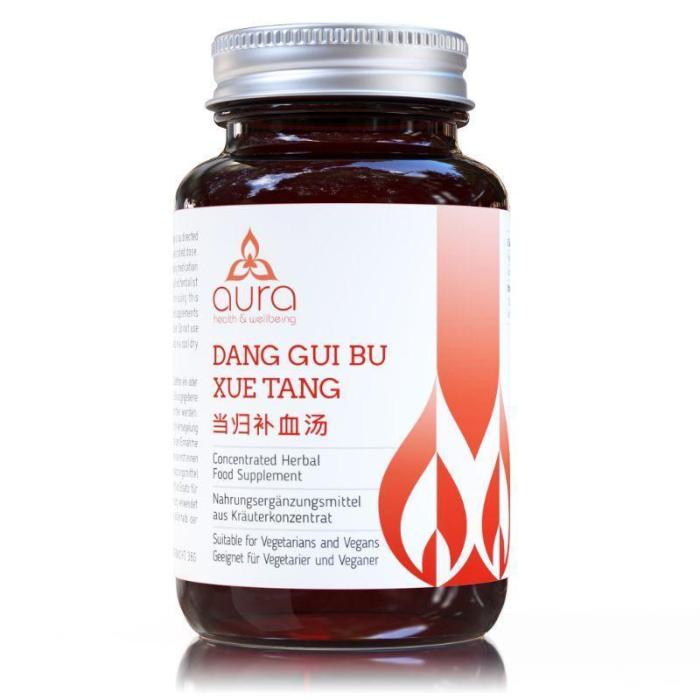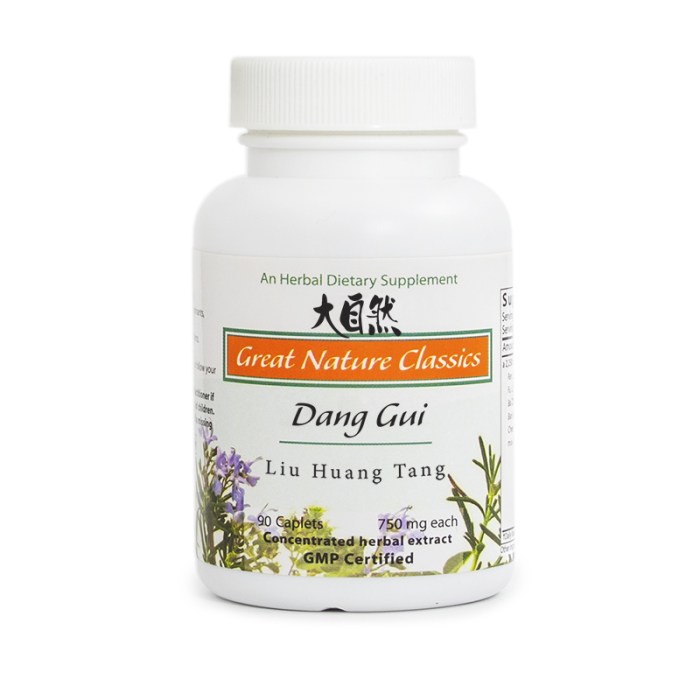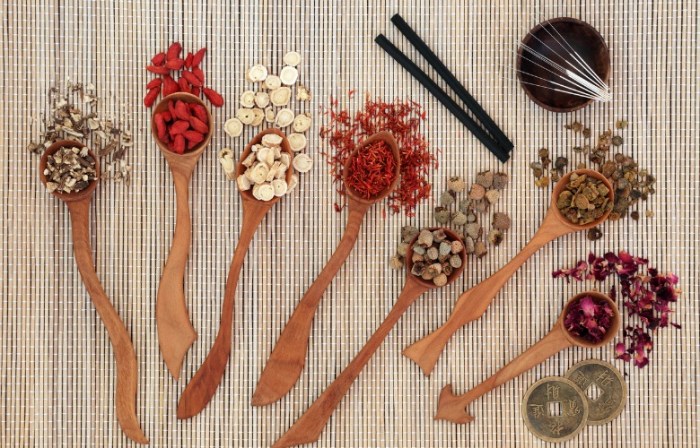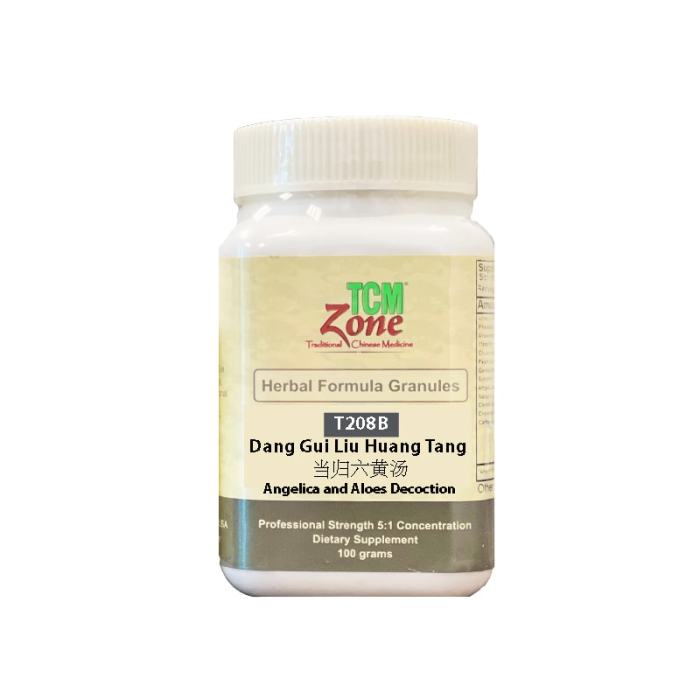Embark on a journey into the world of Dang Gui Liu Huang Tang, an ancient Chinese herbal formula that has stood the test of time. With its roots firmly planted in traditional medicine, this enigmatic elixir holds a treasure trove of therapeutic secrets, ready to be unveiled.
Dang Gui Liu Huang Tang, a harmonious blend of potent herbs, has been revered for centuries for its ability to revitalize blood flow, quell inflammation, and alleviate pain. Join us as we delve into its fascinating history, explore its medicinal properties, and unravel its potential in modern healthcare.
Overview of Dang Gui Liu Huang Tang

Dang Gui Liu Huang Tang, also known as Angelica and Realgar Decoction, is a traditional Chinese medicine formula that has been used for centuries to treat various conditions. It is believed to invigorate the blood, resolve stasis, and reduce pain.
The formula is composed of several herbs, each with its own unique medicinal properties.The primary ingredients in Dang Gui Liu Huang Tang include:
Dang gui (Angelica sinensis)
This herb is known for its ability to invigorate the blood and promote circulation. It is also believed to have anti-inflammatory and analgesic effects.
Liu huang (Realgar)
This mineral is known for its ability to resolve stasis and reduce pain. It is also believed to have antibacterial and antifungal properties.
Chuan xiong (Ligusticum chuanxiong)
This herb is known for its ability to promote circulation and relieve pain. It is also believed to have antispasmodic and sedative effects.
Tao ren (Peach kernel)
This herb is known for its ability to invigorate the blood and resolve stasis. It is also believed to have laxative and anti-inflammatory effects.
Hong hua (Safflower)
This herb is known for its ability to promote circulation and reduce pain. It is also believed to have anti-inflammatory and antioxidant effects.
Pharmacological Actions of Dang Gui Liu Huang Tang

Dang Gui Liu Huang Tang exerts various pharmacological actions that contribute to its therapeutic effects. Scientific studies have demonstrated its efficacy in improving blood circulation, reducing inflammation, and alleviating pain.
Effects on Blood Circulation
Dang Gui Liu Huang Tang promotes blood circulation by dilating blood vessels and reducing blood viscosity. The active ingredients in the formula, such as dang gui and chuanxiong, have been shown to inhibit platelet aggregation and improve microcirculation. This enhanced blood flow can help alleviate symptoms associated with poor circulation, such as numbness, tingling, and cold extremities.
Anti-inflammatory Effects
Dang Gui Liu Huang Tang possesses anti-inflammatory properties that can help reduce pain and swelling. Studies have shown that the formula can inhibit the production of inflammatory cytokines and promote the resolution of inflammation. This anti-inflammatory action may be beneficial in treating conditions such as rheumatoid arthritis, osteoarthritis, and inflammatory bowel disease.
Pain Management
Dang Gui Liu Huang Tang has analgesic effects that can help relieve pain. The formula contains compounds that act on pain receptors and inhibit the transmission of pain signals. This pain-relieving action may be useful in managing various types of pain, including musculoskeletal pain, neuropathic pain, and menstrual cramps.
Potential Role in Treating Health Conditions, Dang gui liu huang tang
Due to its pharmacological actions, Dang Gui Liu Huang Tang has been used in traditional Chinese medicine to treat a wide range of health conditions. These conditions include:
- Cardiovascular diseases
- Rheumatic diseases
- Gynecological disorders
- Digestive disorders
- Painful conditions
Further research is needed to fully understand the efficacy and safety of Dang Gui Liu Huang Tang for specific health conditions. However, the pharmacological actions of the formula suggest that it may have therapeutic potential in treating various ailments.
Clinical Applications of Dang Gui Liu Huang Tang

Dang Gui Liu Huang Tang is a versatile herbal formula with a wide range of clinical applications. It has been traditionally used to treat various health conditions, particularly those related to gynecology, cardiovascular health, and pain management.
Gynecological Disorders
Dang Gui Liu Huang Tang is commonly used to address gynecological issues such as menstrual irregularities, dysmenorrhea, and postpartum recovery. Its blood-activating and qi-regulating properties help alleviate pain, improve menstrual flow, and promote uterine health.
Cardiovascular Diseases
The formula’s blood-thinning and anti-inflammatory effects make it beneficial for treating cardiovascular conditions such as angina, coronary artery disease, and hypertension. It helps improve blood circulation, reduce blood pressure, and prevent blood clots.
Pain Syndromes
Dang Gui Liu Huang Tang has analgesic and anti-inflammatory properties that make it effective in managing various pain syndromes. It is commonly used to relieve pain associated with headaches, migraines, musculoskeletal disorders, and nerve damage.
Preparation and Administration of Dang Gui Liu Huang Tang
Traditionally, Dang Gui Liu Huang Tang is prepared by decocting the herbs in water. The dried herbs are typically combined with water in a ratio of 1:10 (1 part herb to 10 parts water) and boiled for 30-60 minutes. The resulting decoction is then strained and taken orally.
The recommended dosage of Dang Gui Liu Huang Tang varies depending on the individual’s condition and response to the treatment. It is generally recommended to take 10-20 mL of the decoction three times per day. The decoction can be taken with or without food.
Dang gui liu huang tang, a traditional Chinese herbal formula, has been used for centuries to treat various conditions. Its name derives from its ingredients, including dang gui (Angelica sinensis) and liu huang (realgar). While exploring the intricacies of dang gui liu huang tang, we stumbled upon the phrase “words with i n c o m e.”
Intrigued, we discovered a list of words that contain the sequence “i n c o m e.” Returning to our study of dang gui liu huang tang, we appreciate its enduring legacy in traditional Chinese medicine.
Potential Interactions and Contraindications
Dang Gui Liu Huang Tang may interact with certain medications, including anticoagulants, antiplatelet agents, and other herbs that have blood-thinning properties. It is important to inform your healthcare provider about all medications you are taking before starting Dang Gui Liu Huang Tang.
Dang Gui Liu Huang Tang is generally contraindicated in people with bleeding disorders, pregnancy, and severe liver or kidney disease.
Modern Research on Dang Gui Liu Huang Tang
Dang Gui Liu Huang Tang has garnered considerable attention in modern scientific research due to its potential therapeutic effects in various disease models. Studies have explored its efficacy in conditions such as cancer, cardiovascular diseases, and neurodegenerative disorders.
Cancer Research
Preclinical studies have demonstrated that Dang Gui Liu Huang Tang possesses anti-tumor properties. It has been shown to inhibit cancer cell proliferation, induce apoptosis, and enhance immune responses against cancer cells. Ongoing clinical trials are investigating its potential as an adjuvant therapy in cancer treatment.
Cardiovascular Research
Dang Gui Liu Huang Tang has shown promise in improving cardiovascular health. Animal studies suggest that it may reduce blood pressure, improve blood flow, and protect against heart damage. Clinical trials are underway to evaluate its efficacy in treating hypertension and coronary artery disease.
Neurodegenerative Research
Research indicates that Dang Gui Liu Huang Tang may have neuroprotective effects. It has been found to reduce oxidative stress, improve neuronal function, and promote neurogenesis in animal models of neurodegenerative diseases such as Alzheimer’s and Parkinson’s.
Safety and Efficacy Considerations

Dang Gui Liu Huang Tang is generally considered safe when used appropriately. However, it is essential to consult a qualified healthcare professional before taking this or any herbal supplement to ensure its safety and efficacy for your specific health needs.
Potential Side Effects
- Gastrointestinal symptoms such as nausea, vomiting, or diarrhea
- Skin irritation or allergic reactions
- Headaches or dizziness
Drug Interactions
Dang Gui Liu Huang Tang may interact with certain medications, including anticoagulants, antiplatelet drugs, and diabetes medications. It is important to inform your healthcare provider about all medications you are taking to avoid potential interactions.
Precautions for Use
- Avoid using Dang Gui Liu Huang Tang during pregnancy or breastfeeding.
- Individuals with bleeding disorders or liver disease should exercise caution when using this supplement.
- Long-term use of Dang Gui Liu Huang Tang should be monitored by a healthcare professional.
Recommendations for Safe and Effective Administration
To ensure the safe and effective use of Dang Gui Liu Huang Tang, it is recommended to:
- Consult a qualified healthcare professional before taking this supplement.
- Follow the recommended dosage and duration of use.
- Be aware of potential side effects and drug interactions.
- Store the supplement properly to maintain its potency and prevent contamination.
FAQ Explained
What are the main ingredients of Dang Gui Liu Huang Tang?
Dang Gui Liu Huang Tang is composed of several herbs, including Dang Gui (Angelica sinensis), Liu Huang (Realgar), Chuan Xiong (Ligusticum chuanxiong), and Tao Ren (Peach Kernel).
How is Dang Gui Liu Huang Tang typically administered?
Dang Gui Liu Huang Tang is traditionally prepared as a decoction, where the herbs are boiled in water and the resulting liquid is consumed. It can also be taken in capsule or tablet form.
What are the potential side effects of Dang Gui Liu Huang Tang?
Side effects of Dang Gui Liu Huang Tang are generally mild and may include gastrointestinal discomfort, skin reactions, and potential drug interactions. It is important to consult a qualified healthcare practitioner before using Dang Gui Liu Huang Tang, especially if you have any underlying health conditions.